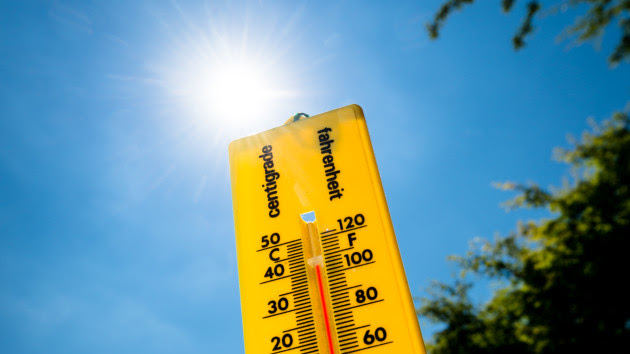(NEW YORK) — As heat waves persist and temperatures across the country continue to soar, the Centers for Disease Control and Prevention is reporting that emergency department visits nationwide have more than doubled in the last month.
In the U.S., an estimated 2,891 out of 100,000 overall emergency department visits were associated with heat-related illnesses for the week of July 2, up from 1,142 for the week of June 11.
ABC News’ chief medical correspondent Dr. Jennifer Ashton explained on Good Morning America Thursday that both extreme heat and humidity can be dangerous.
“Our core temperature [is] normally 98.7 degrees. In an area where the temperatures are 100, 105 [degrees Fahrenheit], evaporation or heat dissipation is impaired,” Ashton said. “That external heat being higher will heat us up and humidity is actually, if not more of a problem than the actual temperature because once it gets too hot and too humid for sweat to evaporate, we can get into serious trouble and if the heat doesn’t drop at night, it gives our body zero chance to recover.”
What are the symptoms of heat-related illness?
Ashton said anyone can be at risk of a heat-related illness during an extreme heat event.
“It’s really important for people to understand that it’s not just the old, the young, the vulnerable. This can happen to everyone and it’s a spectrum of severity,” Ashton said.
Signs of heat-related illness include:
• Heat exhaustion
• Headache
• Nausea
• Dizziness
• Thirst
• Heavy sweating
• An elevated body temperature
“If you feel or see any of these signs or symptoms, you need to get out of the heat before it progresses to heat stroke which is a true 911 emergency room medical emergency,” Ashton added.
The symptoms of heat stroke, a life-threatening condition where the body stops sweating and body temperature becomes extremely high, include:
• Heat stroke
• Confusion
• Slurred speech
• Loss of consciousness or fainting
• Hot, dry skin
• Seizures
• Very high body temperature
“For people who work outside or for children, particularly small children … the heat is so high that a lot of outdoor activities are going to be canceled. If they can occur indoors, they have to be altered,” Ashton said.
The do’s of heat safety
Stay hydrated and reach for cool beverages when the temperatures climb, Ashton suggested. Use a large, refillable water bottle if on the go.
Seek shade and stay in an air-conditioned place, if possible. If your home doesn’t have air conditioning, go to a shopping mall, public library or public cooling center even for a few hours, to help the body stay cooler.
Apply sunscreen with an SPF of 15 or higher at least 30 minutes prior to going outside.
Wear lightweight, loose-fitting clothing, a wide brimmed hat and sunglasses.
The don’ts of heat safety
Ashton recommends avoiding very sugary drinks, beverages with caffeine or alcoholic drinks, which can cause the body to lose more fluid.
Ashton added, “If you cannot take breaks, you should not be outside for a prolonged period of time.”
Copyright © 2023, ABC Audio. All rights reserved.












